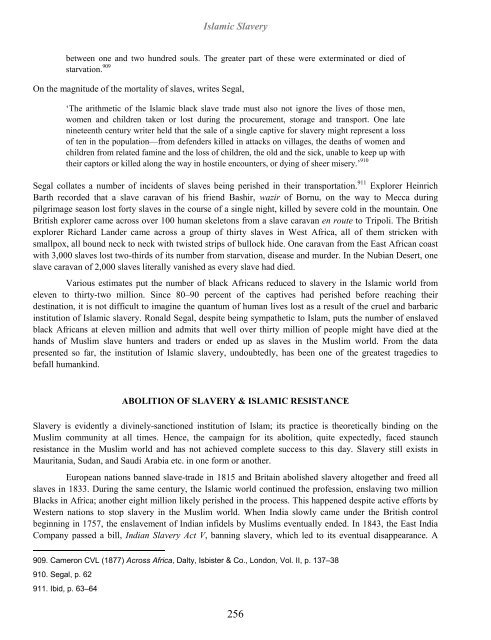islamic-jihad-legacy-of-forced-conversion-imperialism-slavery
islamic-jihad-legacy-of-forced-conversion-imperialism-slavery
islamic-jihad-legacy-of-forced-conversion-imperialism-slavery
- No tags were found...
Create successful ePaper yourself
Turn your PDF publications into a flip-book with our unique Google optimized e-Paper software.
Islamic Slaverybetween one and two hundred souls. The greater part <strong>of</strong> these were exterminated or died <strong>of</strong>starvation. 909On the magnitude <strong>of</strong> the mortality <strong>of</strong> slaves, writes Segal,‘The arithmetic <strong>of</strong> the Islamic black slave trade must also not ignore the lives <strong>of</strong> those men,women and children taken or lost during the procurement, storage and transport. One latenineteenth century writer held that the sale <strong>of</strong> a single captive for <strong>slavery</strong> might represent a loss<strong>of</strong> ten in the population—from defenders killed in attacks on villages, the deaths <strong>of</strong> women andchildren from related famine and the loss <strong>of</strong> children, the old and the sick, unable to keep up withtheir captors or killed along the way in hostile encounters, or dying <strong>of</strong> sheer misery.’ 910Segal collates a number <strong>of</strong> incidents <strong>of</strong> slaves being perished in their transportation. 911 Explorer HeinrichBarth recorded that a slave caravan <strong>of</strong> his friend Bashir, wazir <strong>of</strong> Bornu, on the way to Mecca duringpilgrimage season lost forty slaves in the course <strong>of</strong> a single night, killed by severe cold in the mountain. OneBritish explorer came across over 100 human skeletons from a slave caravan en route to Tripoli. The Britishexplorer Richard Lander came across a group <strong>of</strong> thirty slaves in West Africa, all <strong>of</strong> them stricken withsmallpox, all bound neck to neck with twisted strips <strong>of</strong> bullock hide. One caravan from the East African coastwith 3,000 slaves lost two-thirds <strong>of</strong> its number from starvation, disease and murder. In the Nubian Desert, oneslave caravan <strong>of</strong> 2,000 slaves literally vanished as every slave had died.Various estimates put the number <strong>of</strong> black Africans reduced to <strong>slavery</strong> in the Islamic world fromeleven to thirty-two million. Since 80–90 percent <strong>of</strong> the captives had perished before reaching theirdestination, it is not difficult to imagine the quantum <strong>of</strong> human lives lost as a result <strong>of</strong> the cruel and barbaricinstitution <strong>of</strong> Islamic <strong>slavery</strong>. Ronald Segal, despite being sympathetic to Islam, puts the number <strong>of</strong> enslavedblack Africans at eleven million and admits that well over thirty million <strong>of</strong> people might have died at thehands <strong>of</strong> Muslim slave hunters and traders or ended up as slaves in the Muslim world. From the datapresented so far, the institution <strong>of</strong> Islamic <strong>slavery</strong>, undoubtedly, has been one <strong>of</strong> the greatest tragedies tobefall humankind.ABOLITION OF SLAVERY & ISLAMIC RESISTANCESlavery is evidently a divinely-sanctioned institution <strong>of</strong> Islam; its practice is theoretically binding on theMuslim community at all times. Hence, the campaign for its abolition, quite expectedly, faced staunchresistance in the Muslim world and has not achieved complete success to this day. Slavery still exists inMauritania, Sudan, and Saudi Arabia etc. in one form or another.European nations banned slave-trade in 1815 and Britain abolished <strong>slavery</strong> altogether and freed allslaves in 1833. During the same century, the Islamic world continued the pr<strong>of</strong>ession, enslaving two millionBlacks in Africa; another eight million likely perished in the process. This happened despite active efforts byWestern nations to stop <strong>slavery</strong> in the Muslim world. When India slowly came under the British controlbeginning in 1757, the enslavement <strong>of</strong> Indian infidels by Muslims eventually ended. In 1843, the East IndiaCompany passed a bill, Indian Slavery Act V, banning <strong>slavery</strong>, which led to its eventual disappearance. A909. Cameron CVL (1877) Across Africa, Dalty, Isbister & Co., London, Vol. II, p. 137–38910. Segal, p. 62911. Ibid, p. 63–64256


